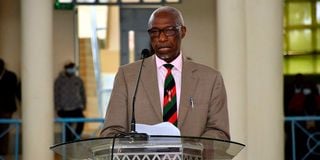Change of heart as KU land flips back for WHO regional hub

Kenyatta University Vice-Chancellor Paul Wainaina addresses the institution’s staff members on July 12, 2022 shortly before he was suspended. Prof Wainaina has since been reinstated.
President William Ruto's administration has made a U-turn on the allocation of 30 acres of Kenyatta University land to the World Health Organisation, reversing its vehement opposition to the deal that saw the university's Vice Chancellor Prof Paul Wainaina publicly spar with retired President Uhuru Kenyatta.
Prof Wainaina had opposed the allocation of the land to the state for the government project.
He refused to surrender the title deed, claiming that the land on which the hospital stands belongs to Kenyatta University.
In two letters dated 4 July 2022 and 7 July 2022, Head of Civil Service Joseph Kinyua ordered Prof Paul Wainaina to surrender the title deed for Kenyatta University LR No 1102/26 to allow the Ministry of Lands and Planning to take over part of the land as directed by the Cabinet.
After his refusal, former President Uhuru Kenyatta threatened to deal 'swiftly and effectively' with the management of Kenyatta University.
It took just two days for the axe to fall when Prof Wainaina was suspended for 30 days 'pending investigations' into allegations of 'misconduct'.
In his place, the Council appointed the Deputy Vice-Chancellor (Academic Affairs), Prof Waceke Wanjohi.
On 13 July 2022, Justice Oscar Angote blocked the subdivision of the land and restrained the government from harassing university officials and the university from handing over the title.
After two months, the court ordered Kenyatta University to reinstate Prof Wainaina, whose return was greeted with jubilation at the university.
Immediately after he was sworn in, President Ruto's government maintained its public support for the vice-chancellor, who was appointed to the Presidential Task Force on Education Reforms.
"It's very painful. We worked to build the hospital and when it was completed, it was taken away from us. We feel terrible that our students cannot use its facilities," said Prof Wainaina upon his reinstatement in November.
He added: "The land is not idle, it is already planned. He revealed that the council had even submitted the physical plan for the developments they intended to put up, including student hostels.
But in a change of heart, Sunday Nation has established that the government has since reverted to the original deal struck by the Uhuru Kenyatta administration to hand over the 30 acres to the WHO.
Speaking at Kenyatta University's 52nd graduation ceremony on 17 December 2022, Deputy President (DP) Rigathi Gachagua said the land would be returned to the institution in its entirety, with only a small portion of the land being hived off to settle Kamae squatters who have been claiming ownership of part of the land.
Mr Gachagua said if the Kenya Kwanza team had lost the election, the institution would have lost its prime land to "grabbers".
"If things had gone wrong and William Ruto was not elected President, your land would have already been grabbed. We have therefore instructed the Ministry of Lands to cancel these allocations and return the land to Kenyatta University," Mr Gachagua said at the time.
Mr Gachagua apologised to Prof Wainaina for the humiliation he suffered after the row, which saw him sacked until the new regime intervened.
Just three months after he apologised to Prof Wainaina, his boss, President William Ruto, granted the WHO 30 acres of land belonging to Kenyatta University, saying the project would position Kenya as a regional hub.
He had previously rejected the move.
The Sunday Nation noted that Kenya would have lost more than it would have gained if the Emergency Regional Hub for Eastern and Southern Africa had been located elsewhere.
According to the WHO, Kenya is the most strategic location for the hub, with easy access to 25 countries in the region. Dr Ruto has also promised to give the WHO an additional 50 acres of land in Mombasa for its use.
"It hasn't been easy; it's been a long journey, but it's happened because you wanted it to happen," said Dr Abdourahmane Diallo, WHO representative, during the signing of a memorandum of understanding at Afya House that will see the organisation establish the Emergency Regional Hub for Eastern and Southern Africa.
Dr Ruto said the hub would provide employment opportunities, capacity building and technology transfer.
The Ministry of Health confirmed that the government has since allocated 30 acres of land with an additional $5 million to WHO to establish the World Regional Emergency Hub and Training Centre.
According to the Cabinet Secretary for Health, Susan Nakhumicha, the hub will be a major step forward in strengthening the country's and Africa's response to emergencies.
Ms Nakhumicha, who signed the MoU on behalf of the government, described the establishment of the hub as a "long overdue, historic and momentous occasion".
The Emergency Regional Hub for Eastern and Southern Africa is expected to coordinate high quality responses to health emergencies in Kenya and the region, and serve as a modern storage facility for essential medical equipment and consumables.
The hub is also expected to provide timely support to countries experiencing emergencies.






